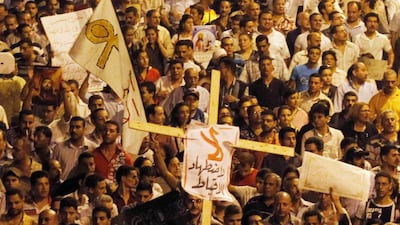Egyptian prosecutors on Tuesday sent a man to trial charged with stabbing to death a Coptic Christian priest in the Mediterranean city of Alexandria last month.
The public prosecution said that a psychological examination of the accused showed he did not suffer from any mental illness and was fully aware of, and responsible for, his actions at the time of the crime.
He has also been charged of the illegal possession of a weapon, a reference to the knife used in the attack, the prosecution said.
No date has been set for the trial, but the accused could face the death sentence if convicted of murder.
The victim was identified by the Coptic Orthodox church as Arsanious Wadid Rizqallah, 56, who served in an Alexandria church.
The prosecution did not identify the accused.
Regional media reports identified him as Nehru Tawfeeq, 60, and said he was a member of an extremist group in the 1990s and jailed for his involvement in terror attacks.
He later received a presidential pardon and was released.
Sectarian violence is not uncommon in Egypt, a majority Muslim nation of 102 million people and home to the Middle East’s largest Christian community.
Extremists have targeted Christians in recent years, especially after the 2013 removal of president Mohammed Morsi, a Muslim Brotherhood member, amid mass street protests against his divisive rule.
In September 2017, an ISIS supporter stabbed to death an 82-year-old Christian doctor in Cairo. He was sentenced to death the following year.
There have also been suicide bombings in churches in Cairo, Alexandria and a city in the Nile Delta north of the capital.
Pilgrims travelling to isolated desert monasteries have also been targets.
Egypt’s Christians, most of them followers of the Orthodox Coptic Church, make up about 10 per cent of the population.
They complain of discrimination, although they have enjoyed the patronage and support of President Abdel Fattah El Sisi since he took office nearly eight years ago.


